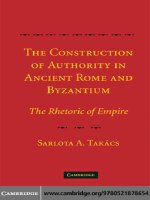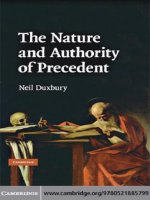cambridge university press the autonomy of morality jul 2008 kho tài liệu bách khoa
Bạn đang xem bản rút gọn của tài liệu. Xem và tải ngay bản đầy đủ của tài liệu tại đây (1.29 MB, 289 trang )
This page intentionally left blank
The Autonomy of Morality
In The Autonomy of Morality, Charles Larmore challenges two ideas
that have shaped the modern mind. The world, he argues, is not a
realm of value-neutral fact, nor is reason our capacity to impose
principles of our own devising on an alien reality. Rather, reason
consists in being responsive to reasons for thought and action that
arise from the world itself. In particular, Larmore shows that the
moral good has an authority that speaks for itself. Only in this light
does the true basis of a liberal political order come into view, as well
as the role of unexpected goods in the makeup of a life lived well.
Charles Larmore is W. Duncan MacMillan Family Professor in the
Humanities and Professor of Philosophy at Brown University. He is
the author of The Morals of Modernity and The Romantic Legacy and a
member of the American Academy of Arts and Sciences. In 2004,
he received the Grand Prix de Philosophie from the Acade´mie
Franc¸aise for his book Les pratiques du moi.
In memory of Marlowe
The Autonomy of Morality
CHARLES LARMORE
Brown University
CAMBRIDGE UNIVERSITY PRESS
Cambridge, New York, Melbourne, Madrid, Cape Town, Singapore, São Paulo
Cambridge University Press
The Edinburgh Building, Cambridge CB2 8RU, UK
Published in the United States of America by Cambridge University Press, New York
www.cambridge.org
Information on this title: www.cambridge.org/9780521889131
© Charles Larmore 2008
This publication is in copyright. Subject to statutory exception and to the
provision of relevant collective licensing agreements, no reproduction of any part
may take place without the written permission of Cambridge University Press.
First published in print format 2008
ISBN-13
978-0-511-42888-3
eBook (EBL)
ISBN-13
978-0-521-88913-1
hardback
ISBN-13
978-0-521-71782-3
paperback
Cambridge University Press has no responsibility for the persistence or accuracy
of urls for external or third-party internet websites referred to in this publication,
and does not guarantee that any content on such websites is, or will remain,
accurate or appropriate.
Contents
Acknowledgments
Introduction: Response and Commitment
p ar t i
page ix
1
r e a s on an d r e a s on s
1 History and Truth
1. Historicist Skepticism
2. Growth and Progress
3. Agreeing and Coping
4. Overcoming Dualisms
5. Moral Progress
19
20
22
25
28
30
2 Back to Kant? No Way
1. Kant’s Modesty
2. Dualisms and Ultimate Principles
3. Kant on Reason
4. The Fate of Autonomy
33
34
37
39
43
3 Attending to Reasons
1. Introduction
2. Experience and Reality
3. Experience as a Tribunal
4. Platonisms
5. The Conservation of Trouble
47
47
51
55
60
64
part ii
the moral point of view
4 John Rawls and Moral Philosophy
1. The One and the Many
2. The Critique of Utilitarianism
3. Hume vs. Kant
4. Moral Constructivism
69
69
72
76
81
v
Contents
vi
5 The Autonomy of Morality
1. The Problem with Morality
2. Morality and Advantage
3. Instrumentalism and Its Failure
4. Letting Morality Speak for Itself
5. The Ethics of Autonomy
6. Reflection and Reasons
7. Reconceiving the World
8. Reconceiving the Mind
part iii
87
87
91
95
103
105
112
123
129
p o l i t i c al p ri nc i p l e s
6 The Moral Basis of Political Liberalism
1. Introduction
2. Classical and Political Liberalism
3. Political Legitimacy and Moral Respect
4. Rawls’ Ambiguities
5. What Habermas and Rawls Share
6. Metaphysics and Politics
7. Habermas’ Ideal of Political Autonomy
8. Democracy and Liberalism
9. Freedom and Morality
139
139
144
146
149
153
155
158
160
164
7 The Meanings of Political Freedom
1. Three Concepts of Liberty
2. Freedom and Self-Government
3. Freedom and Pluralism
4. Republican vs. Liberal
5. Domination and Respect
168
169
175
178
184
190
8 Public Reason
1. Publicity in A Theory of Justice
2. From Publicity to Public Reason
3. The Domain of Public Reason
4. Aims and Exceptions
5. Conclusion
196
197
203
208
213
219
part iv
t ru t h an d c ha n ce
9 Nietzsche and the Will to Truth
1. Pious and Free Spirits
2. Truth and Morality
3. Deception and Self-deception
4. Truth and Thought
5. Perspectivism
6. Truth as a Goal
7. Overcoming the Ascetic Attitude
223
223
225
227
230
234
237
243
Contents
vii
10 The Idea of a Life Plan
1. A Philosophical Prejudice
2. Ancient Roots
3. The Rawlsian Conception
4. Some Other Objections
5. Prudence and Wisdom
246
246
253
259
262
268
Index
273
Acknowledgments
I would like to thank Beatrice Rehl, my editor at Cambridge University
Press, for her help in the preparation of this volume. My thanks to Ronald
Cohen, who edited the manuscript with great care and made many helpful
comments and suggestions. I am also indebted to many colleagues and
audiences, too numerous to mention, for their comments and criticisms
over the years as I wrote and presented various versions of the essays
collected here.
Finally, I owe everything to my dear wife Amey, who keeps me going.
All of the previously published essays in this volume have been significantly and extensively revised, and I would like to thank the original
publications and publishers that kindly granted me permission to use them
here:
Chapter 1, “History and Truth.” Originally published in Daedalus (summer
2004), pp. 46–55. Copyright ª 2004 American Academy of Arts and
Sciences. Reprinted with permission.
Chapter 2, “Back to Kant? No Way.” Originally published in Inquiry 46(2)
( June 2003), pp. 260–271. Copyright ª 2003 Taylor & Francis. Reprinted
with permission.
Chapter 3, “Attending to Reasons.” Originally published in Nicholas
Smith (ed.), Reading McDowell (London and New York: Routledge, 2002),
pp. 193–208. Copyright ª 2003 Routledge Ltd. Reprinted with permission.
Chapter 4, “John Rawls and Moral Philosophy.” Originally published under
the title, “Lifting the Veil” in The New Republic, 5 February 2001. Copyright ª
2003 Charles Larmore. Reprinted with permission.
Chapter 5, “The Autonomy of Morality,” is new.
ix
x
Acknowledgments
Chapter 6, “The Moral Basis of Political Liberalism.” Originally published
in The Journal of Philosophy 96(12), December 1999, 599–625. Copyright ª
1999 The Journal of Philosophy. Reprinted with permission.
Chapter 7, “The Meanings of Political Freedom.” Originally published under
the title “A Critique of Philip Pettit’s Republicanism” in Nouˆs: Philosophical
Issues (Oxford: Blackwell, 2001), vol. 11, pp. 229–243. Copyright ª 2001
Blackwell. Reprinted with permission.
Chapter 8, “Public Reason.” Originally published in Samuel Freeman (ed.),
The Cambridge Companion to Rawls (Cambridge: Cambridge University Press,
2003), pp. 368–393. Copyright ª 2003 Cambridge University Press.
Reprinted with permission.
Chapter 9, “Nietzsche and the Will to Truth.” Originally written in German
and published under the title “Der Wille zur Wahrheit” in O. Ho¨ffe (ed.),
Nietzsche: Zur Genealogie der Moral (Klassiker Auslegen) (Berlin: AkademieVerlag, 2004), pp. 163–176. Copyright ª 2004 Akademie-Verlag.
Chapter 10, “The Idea of a Life Plan.” Originally published in Social
Philosophy & Policy 16(1), 1999, 96–112. Copyright ª 1999 Cambridge
University Press. Also published in E. F. Paul et al. (eds.), Human Flourishing
(Cambridge: Cambridge University Press, 1999). Copyright ª 1999
Cambridge University Press. Reprinted with permission.
Introduction
Response and Commitment
In an earlier collection of essays, The Morals of Modernity,1 I argued that our
moral self-understanding, even at its most fundamental, needs to draw
upon the distinctive forms of modern experience. All our thinking is
shaped by our historical context. Philosophy is no exception and,
committed as it is to being fully explicit about its assumptions and goals,
it ought to acknowledge the ties of time and place that give it substance
and direction. I have not abandoned this conviction, as many of the essays
in the present volume attest. Yet I have also gone on to pursue a lot further
another theme in the earlier volume that is very much at odds with
a dominant strand of modern thought.
The principles by which we determine what to believe or do must in the
end, so it is often held, be principles of our own making. Once the
Enlightenment has undone the notion that they are imposed on us by
a higher being, and the Scientific Revolution shown that they cannot be
read off the fabric of the world, which is now seen to be normatively mute
and devoid of directives, the conclusion appears inescapable that we alone
must be their source. The authority of any principle of thought and action
is an authority we bestow upon it ourselves. This idea of the autonomy of
reason, far more common than the Kantian tradition from which the term
itself derives, seems to me profoundly mistaken. Reason, indeed thought
in general, involves an essential responsiveness to reasons. We cannot
believe or do even the most insignificant of things except insofar as we see
some basis or reason for doing so. Far from being the authors of the
principles by which we live, we must conceive of them as binding on us
from without, not only in moral matters but in every area. The point is not
our need for divine tutelage. Quite the contrary, it is the need to revise the
reigning image of what the world itself is like. To make sense of how we
think and what we care about, we have to see reality as embodying
1
The Morals of Modernity (Cambridge: Cambridge University Press, 1996).
1
The Autonomy of Morality
2
a normative dimension. Commitment is unintelligible except as a response
to the existence of reasons.
Now my very dissatisfaction with so pervasive a tendency of the modern
mind might be taken as evidence of a general truth to which the idea of
historical rootedness fails to do justice. However much we may be a part of
our time and place, we retain the capacity to question accepted opinion
and set out on a path of our own. This is undeniable. Yet nothing in the
idea of rootedness, properly understood, really goes to deny it. After all,
holding to some belief or practice, be it ever so firmly, entails being able to
stand back and see ourselves from the outside. For we are not moved by
reasons as we are by mere causes, but only in virtue of acknowledging their
force, which means that on reflection (though then only by reference to
other reasons) we must be able to weigh the value of committing ourselves
as they demand. Though Hegel rightly spoke of reason’s need to reconcile
itself to its place in history, we can never come to feel so fully at home that
we lose that inner distance to our commitments, that ability to have
determined otherwise, which the Romantics whom he loathed called the
element of irony in even our most serious of endeavors.2
All the same, I would also point out that my opposition to the modern
notion of reason as autonomous has to do with what I take to be a selfmisunderstanding. The target of my discontent is not, at least primarily,
the moral and political principles characteristic of modern thought at its
best, but rather its conception of what must be the basis of our allegiance
to them – though this conception does embody a certain ideal of freedom
with substantial implications for how we are to live our lives. My primary
ambition is to have us see more clearly where we stand. And so, here too,
philosophical argument remains moored in the present.
The first chapter of this book, “History and Truth,” takes up again this
refrain of the earlier book, showing why a sense of history ought not to
produce a diminished devotion to truth. But it will be helpful if in this
Introduction as well I describe in some detail the historically minded view
of moral philosophy to which I have long been wedded. Then I can return
to explain the principal theme of the present book, the responsiveness of
our deepest commitments to an independent order of principles, and
show how the two concerns fit together.
THE IMPORTANCE OF HISTORY
The Morals of Modernity grew out of my conviction that moral philosophy
should be pursued with a historical sensibility. Such is not the spirit in
which moral philosophers ordinarily go about their work. Their usual
procedure is to treat the nature of morality as though it were essentially
2
See my book, The Romantic Legacy (New York: Columbia University Press, 1996), pp. 76–83.
Introduction
3
timeless in character, unaffected by any deep historical shifts in the way
people conceive of their world and themselves. Reference may be made to
great thinkers of the past, but they are invoked for their insights or
mistakes about a subject matter presumed to be fundamentally unchanging. Even when the focus becomes some specifically modern development,
the approach often remains the same. Liberal democracy, for instance, is
regularly seen as a form of political life whose distinctive principles could
have been known all along to define the proper goals of government and
the dignity of the individual.
There have been, to be sure, notable exceptions to this tendency. But it
is the norm, and it represents a mistake. Philosophy in general is wrong to
aim at standing free from the vicissitudes of history. For then it must either
fail to achieve anything of substance or misunderstand the conditions of its
own success. Moral philosophy is no exception. Systematic reflection about
the nature of the good and the right cannot hope to find much guidance
in formal concepts of practical rationality, which tell us in essence only
that we should pursue efficiently the things we hold to be valuable (that we
should maximize expected utility, according to the technical jargon), but
not what it is that we ought in fact to value. (I develop this point at some
length in Chapter 5 of this book.) Nor will we make much headway if we
simply bring in a knowledge of the essentials of the human condition
along with a stock of moral truisms such as “promises are to be kept” and
“the innocent are not to be harmed.” To get a handle on the philosophical
questions that matter – for instance, the relation between the demands of
morality and the pursuit of our own good, the basic unity or instead
heterogeneity of what we owe to others as well as of what constitutes the
human good, the proper goals of political association – we must turn to the
resources that our own historical situation provides us. We need most of all
to make use of one of the cardinal lessons of modernity, which is that the
ultimate ends of life are bound to be an object of reasonable disagreement
and that a core morality, binding on all despite their differing ideals of the
human good, is therefore an institution of immeasurable value. We must
also rely upon the traditions of moral thought, various and contingent
though they are, that have shaped our sense of what is obligatory, noble, or
unconscionable and given us what are indeed substantive principles of
judgment and action. So we do anyway, if only implicitly or unknowingly,
whenever we manage to say something of real moment (which does not, it
is true, happen all that often in moral philosophy). To recognize the need
to base ourselves on historical givens, instead of aspiring to some transcendent point of view, is thus to remove a crippling source of error and
confusion.
Reflection, even in philosophy, cannot but base itself on commitments
we already have, since its essence is to be the response to a problem. We do
not reflect for the pure pleasure of reflecting, but because some idea or
4
The Autonomy of Morality
experience has disrupted our ordinary expectations, obliging us to find
a way of revising them, and we could not even identify the problem, much
less work out a solution, except in the light of our existing beliefs and
interests. Reflection is always situated. To take this truth to heart is to see
the merits of what I call a “contextualist” epistemology.3 What is it for
a belief, moral or otherwise, to count as justified? Answers to this question
have generally fallen into two opposing molds, “foundationalist” or
“coherentist”: either the reasons to accept some view are thought to rest in
the end upon a special class of beliefs that we can see to be true in some
immediate fashion, without appeal to yet further beliefs, or the reasons to
accept it are held to turn upon its forming an integral part of some broad
web of belief whose various elements lend one another mutual support.
This conflict is a recurrent feature of the philosophical landscape, and yet
the two warring camps share a crucial and dubious assumption. They both
suppose that no view is really justified unless the considerations serving to
warrant its acceptance have themselves the status of being justified. As
a result, they both maintain that all our existing beliefs stand in need of
justification simply by virtue of our having them at all. Otherwise, it is
thought, we would not be entitled to rely upon them in figuring out what
else we should accept.
The common idea that every justifying belief, and thus every belief as
such, should be justified mistakes the point of justification, however.
Asking whether some view ought to be accepted is one of the things we do
when we reflect. It is a response to a problem, and only what is problematic
calls for justification. Whether we should adopt a belief we do not yet have
certainly counts as a problem, and that is why we are right to seek its
justification, determining whether there are positive reasons to think it
true. The fact that we already hold a belief does not, by contrast, constitute
a problem – unless, of course, we have come upon reasons to think it
might be false (one such reason cannot be merely the fact that we possess
it), and so only under such circumstances must we set about ascertaining
its credentials. The proper object of justification is not belief but rather
changes in belief. We need to worry about the grounds for some view when
it is one we are deciding whether to adopt or one we already hold but have
reason to contemplate modifying or rejecting. Questions of justification
arise within a context of existing beliefs that do not themselves have to be
justified. They need not even be regarded as having been justified once
upon a time, nor of course do they count as justified by virtue of the mere
fact that they are held. Their status consists in being understood as true,
3
The term “contextualism” is used in epistemology today to mean many different things, not
all of which I am inclined to endorse. I have in mind a certain view about the justification of
belief. My ultimate source of inspiration is C. S. Peirce, and I am also indebted to the
writings of Isaac Levi, such as The Enterprise of Knowledge (Cambridge, MA: MIT Press, 1980).
Introduction
5
since such is the sense in which they function as beliefs: to believe that p
consists in being disposed to think and act in accord with the presumed
truth of p.4 Existing beliefs define the setting in which problems take
shape and provide the premises from which solutions can be devised. They
are not in themselves a problem.
In this light, it ought to be clear why moral philosophy should proceed
in a historical spirit, taking its bearings from the traditions of thought and
forms of experience that have made us who we are. It is a matter of doing
more consciously, and so more knowledgeably and carefully, what we must
do in any case if we are to achieve something of consequence. Outside
philosophy, inquiry can afford to ignore its historically conditioned character. There, the leading aim is to solve the problems at hand, in order to
be better able to handle others in the future. Not so in philosophy,
whatever the particular domain. Progress here means not just solving
problems, but also making as explicit as possible the assumptions guiding
the way we go about it. To say this is not to dictate in some substantive way
what it is that philosophy should be. Attempts to delimit its peculiar
methods or subject matter, which is the form substantive definitions regularly take, never succeed since they simply reflect the predilections of
some particular philosophical movement. But something more general
does appear distinctive of all philosophy, as shown by both those attempts
and the exposures of their failure, and that is its commitment to being
fully self-aware. To take this ideal seriously, I maintain, is to keep in view
the historicity of the problems we face and of the resources we bring to
bear on them.
In The Morals of Modernity, I sometimes held up Hegel as a pioneer of
this approach. But I am no Hegelian. Much of his “system” strikes me as
wrong, outlandish, or unintelligible. There is, in particular, his conviction
that as our ideas of what counts as rational belief or action change over
time, they develop in accord with an inner logic, following a necessary path
that is the course of human history itself. Few today could endorse such
a view. Once it has been discarded, however, a certain skepticism may seem
inescapable. Must not a rejection of the notion that history has a meaning,
when combined with an awareness of how reason depends on history, lead
us to doubt whether we can really claim to have access to truth itself, as
opposed to the picture of the world licensed by our current but changing
standards? If the grounds we have for our present views turn on the
contingencies of tradition and experience, what more can we really mean
by saying that our predecessors were wrong than that they did not happen
to think like us?
Skepticism of this sort is now widespread. It drives the different
currents of so-called post-modernism that have proven so influential in
4
This account of belief is defended in Chapter 5, §8.
The Autonomy of Morality
6
contemporary culture. Although the work of others may be more famous,
the clearest statement of the post-modernist outlook remains an early and
programmatic essay by Jean-Franc¸ois Lyotard. Once we have seen through
the grand modern stories about finding outside history or in the movement of history itself an objective – that is, non-parochial basis for the
evaluation of all human endeavor – we are left, he argued, only with our
various language games themselves, each with its own rules, but without
any impartial standpoint to settle the conflicts between them.5 This looks
like the recipe for a rather facile relativism, and that is what postmodernism has indeed become. Thus there has occurred the expectable
reaction of insisting that we can after all pry ourselves loose from the grip
of history and latch onto timeless standards of belief and action.
Both attitudes miss what was Hegel’s genuine insight, and which we can
recast in a form more compatible with our own greater sense of contingency. Like him, we need to comprehend our rootedness in a particular
time and place as the very means by which we gain access to truth, though
now without any guarantee that where we happen to stand is an inevitable
moment in the human mind’s (or Geist’s) quest for knowledge of itself and
of the world. Our changing views about the proper principles of thought
and action represent a learning process in which we come to see better
how to determine what to think and do, a learning process that proceeds
in much the same way as deciding upon beliefs and actions themselves –
namely, by judging how to make the best sense of our experience in the
light of what we already know. The key is to understand our finitude as
opening us outward rather than hemming us in. As noted before, Chapter 1
in this book gives a general defense of such a position. There I look chiefly
at the case of scientific inquiry. Most of the other chapters focus on questions
in moral and political philosophy, and in them the same conception is
at work.
THE NATURE OF REASON
The essays in this book are also united by a second concern, which has to
do, as I have said, with our need to break with the modern idea of the
autonomy of reason and to recognize the dependence of our thinking,
particularly in the moral and political realm, on principles that bind us
from without. “Autonomy” is itself a term with many meanings, and I
should make clear at the outset which sense I have in mind. Sometimes it
means our capacity to grasp and do what is right regardless of threats or
rewards coming from some superior, human or divine, our right to think
for ourselves instead of having to defer to custom or coercion. In this
5
Jean-Franc¸ois Lyotard, La condition post-moderne (Paris: Minuit, 1979). See also his book, Le
diffe´rend (Paris: Minuit, 1983).
Introduction
7
sense, the term denotes a certain kind of independence that we can or
should enjoy in our relations to others. It is not the object of my critique.
But autonomy can also refer to the nature of our relation to the principles
themselves by which we think and act. Their authority, it is supposed,
comes from us alone, since there can be no reasons to do one thing rather
than another except insofar as we take them to be reasons: it is up to us to
decide what import, if any, the facts as they are will have for our conduct.
That the world itself is normatively mute except for the principles we
impose upon it – this is the idea of autonomy, running through so much of
the moral, political, and even scientific thought of modernity, which I
contest in various ways during the course of this book.
Let me therefore explain a bit more why such an idea has seemed so
persuasive and why it ought nonetheless to be replaced by a different view
of the mind as essentially responsive to reasons. What this different view
involves and how it fits together with my other theme, the essential historicity of reason, also deserve some general remarks, even though the
essays that follow explore these matters in considerable detail.
Ever since the Scientific Revolution, a naturalistic picture of the world
as a realm of value-neutral facts has grown in prestige and has encouraged
in turn the view that how we ought to think and act is ultimately a matter of
principles whose authority derives from us alone. Though not always
explicit, the alliance between these two outlooks has proven extraordinarily influential. For instance, modern conceptions of freedom, whether
their focus is individual conduct or political association, typically gravitate
toward the idea of self-determination, claiming that we ourselves are
responsible, if not for the conditions we find ourselves in, then for the
terms on which we deal with them. Thinking moves so easily along these
lines because of the background assumption that, were it not for the
norms we introduce, there would exist only the things that natural science
has come to take as its domain – matter in motion, along perhaps with
minds (unless they too are but matter in motion), but nothing outside us
to point us one way rather than another. The necessity we face of having to
impose a rational order of our own construction on an alien world is held
to constitute our very dignity as human beings. It is in this regard that Kant
has been the paradigmatic philosopher of modernity. Quite apart from his
more particular doctrines, he was the first to recognize clearly that, once
we accept the naturalism of the scientific worldview, reason must be seen
as essentially self-legislating or “autonomous” if we are to believe that it
exists at all.
I am convinced that this conception of mind and world, however
influential, is fundamentally mistaken. A number of essays in this book,
particularly Chapters 2 through 5, are devoted to showing, by reference to
certain issues in moral philosophy and also by way of generalization, that
a different approach is necessary. Thus I argue in Chapter 5, against some
8
The Autonomy of Morality
of the central strands of modern thought, that there is no way to reason
ourselves into the moral point of view from some supposedly more basic
position outside it: morality speaks for itself, and we must simply see and
acknowledge that another’s good is in itself a reason for action on our
part. This lesson, which I term “the autonomy of morality” (to underscore
the contrast with the Kantian ethic of autonomy), has general implications. Thought is unintelligible unless understood as guided by reasons
that are not of our own making. We cannot, for instance, believe at will
(say, that the number of stars is even), but can only believe what we see
there to be some reason to regard as true. Though freedom is the power to
choose independently of external constraint, choosing entails heeding the
reasons we regard as favoring one thing rather than another. The idea of
self-determination misses the way that the freedom that makes us the
beings we are involves both active and passive moments, commitment as
well as response. It cannot be right to say that we impose our reason on
a normatively mute world. For reason itself consists in a responsiveness to
reasons, reasons that prescribe how we ought to think and act.6
“Naturalism” is invoked today in a number of different senses. Some of
them – that knowledge rests on experience, that explanations appealing to
the supernatural should be avoided – are not at issue. The naturalism I
oppose is the view, increasingly hegemonic in modern times, that all that
there is, properly speaking, is what the natural sciences say to exist –
physical and psychological facts, in other words, and thus nothing intrinsically normative, no facts about what we ought to do. This naturalism,
despite its deference to modern science, is not a theorem of any scientific
theory. It is a metaphysical position, according to which the scientific
image of nature answers our philosophical questions about the ultimate
makeup of reality. As a piece of metaphysics, it is to be judged, as all
metaphysical theories have to be, by considering how well it ties together
our experience as a whole. In this regard, it does quite poorly, I maintain.
If we cannot make sense of reason, or indeed of thinking in general,
except as involving a responsiveness to reasons, then reasons must be seen
as themselves a part of what there is.
The idea that we are in the end bound only by principles we institute
ourselves has had a wider currency than these rather abstract remarks
might suggest. It has played a pervasive role in modern culture, from the
individualist celebration of experiments in living to the aesthetic ideologies of the avant-garde. It comes to powerful expression in the writings of
Friedrich Nietzsche, whose constant refrain – every value we honor, even
the obligation to truth, is a means we have willed, and could have willed
6
I develop this claim, not only in a number of essays in this book, but also in a book I have
published on the nature of the self, Les pratiques du moi (Paris: Presses Universitaires de
France, 2004).
Introduction
9
otherwise, to give shape and meaning to our lives – continues for all its
fundamental incoherence (see Chapter 9) to exercise a continuing fascination on the contemporary mind. The idea of autonomy knows indeed no
party allegiances, since it also inspires a common way of commending the
political ideals of modern liberal democracy, of which Nietzsche himself was
no friend.
In many people’s eyes, it has seemed axiomatic that the ideal of democratic self-government consists in a people or its representatives laying
down themselves, in a legislative assembly or more firmly by way of a constitution, what the rules establishing their common life together shall be.
The principles by which they are to be bound, defining the powers of the
state and the rights of citizens, must be principles whose authority stems
from them alone. This is a deep misunderstanding. As I explain in
Chapters 6 through 8, it misses the moral framework within which alone
liberal democracy acquires its distinctive character. No supposed expression of the people’s will can count as authoritative, no appeal to what
would be the object of reasonable agreement can serve as the standard for
the basic terms of political association, as in the “political liberalism” of
Rawls and similar thinkers (myself included), unless “democratic will” and
“reasonable agreement” are defined by reference to a moral principle of
respect for persons. This principle, requiring that the necessarily coercive
rules of political life be nonetheless acceptable to all whom they are to
bind (acceptable on the assumption that they themselves endorse such
a principle), has therefore an authority independent of the democratic
order itself. For democracy to be possible, citizens must be understood as
standing under the obligation to respect one another as persons, in
advance of the laws they give themselves.
No doubt my insistence that reasons form part of the fabric of reality,
that the world contains a normative dimension to which our reason is
responsive, will strike many as simply extravagant. This impression will not
be lessened by my having sometimes chosen to call the position
“platonistic,” in allusion to this one element of common ground with
Plato’s theory of Forms. Just as Plato held that in addition to trees and our
ideas of trees there must exist the Form, or what it is to be a tree, so I claim
that not all that exists is physical or psychological in character. Reasons,
which are irreducibly normative, must also figure among what is real. “On
the Platonistic picture,” writes Allan Gibbard, “among the facts of the
world are facts of what is rational and what is not . . . If this is what anyone
seriously believes, then I simply want to debunk it.” Gibbard’s scorn turns
out, however, to be little more than an expression of his own parti pris, for
he justifies it by adding, “Nothing in a plausible, naturalistic picture of our
place in the universe requires these non-natural facts.”7 To be sure,
7
Gibbard, Wise Choices, Apt Feelings (Cambridge, MA: Harvard University Press, 1990), p. 154.
10
The Autonomy of Morality
nothing in a naturalistic worldview allows that there exist such things as
reasons and thus facts about what is rational. But the question is precisely
whether that worldview is in the end a tenable one.
It is often said, in company with Max Weber, that in modern times the
world has become “disenchanted” (entzaubert). I am not contesting the
phenomenon. But it is essential to understand aright what it consists in.
Perhaps it is true (though many will disagree) that we can no longer in
good conscience suppose that the world harbors any element of the divine
or the sacred, which is what Weber meant by disenchantment.8 Yet this
does not entail that the world is barren of all normative distinctions.
Sometimes naturalism has leaned upon such an argument, as though
reasons for belief and action must draw their authority from someone –
either God or us. That assumption is incoherent, however. Reasons have
their own authority, and persons acquire authority because of the reasons
we see to trust or honor them. If we ought indeed to endorse the
disenchanted view of the world, then presumably there are good grounds
for doing so distinct from anyone’s say-so or from what happens to be the
spirit of the times, grounds that really do obtain.
Some have promised that we can have “objectivity without objects,” that
we can regard our statements about reasons as true or false without falling
into the platonistic illusion of supposing that there actually are reasons
that make them true or false.9 Unsurprisingly, this via media proves elusive.
Statements are true in virtue of things being as they claim, and to back
away from their objects having to exist means equivocating about their
really being true. Ultimately, the charge of metaphysical extravagance is
but the reflection of an unbudging allegiance, doctrinaire or implicit, to
a pre-given notion of the world. Though there is no point postulating
entities beyond necessity, there is also no point deciding a priori what can
and cannot exist – which includes (as I stress in Chapter 3) refusing to own
up to the implications when we do accept that thinking is essentially
responsive to reasons.
Still, I can dispel some misconceptions if I note right away – I examine
the matter at length in Chapter 5 (§7) – that I am not imagining reasons to
occupy some ethereal, platonic heaven, cut off from the natural world
here below. Reasons for belief and action depend on the physical and
psychological facts being as they are. There is a reason to take an umbrella
only if it is indeed raining, or a reason to get a drink of water only if I
happen to be thirsty. Similarly, reasons exist only insofar as beings exist
capable of doing things for reasons (such beings including, I would add,
8
9
See, for instance, his famous essay, Wissenschaft als Beruf (Berlin: Duncker & Humblot,
1996).
A recent example is Hilary Putnam, Ethics without Ontology (Cambridge, MA: Harvard
University Press, 2004), Chapter 3.
Introduction
11
not just human beings, but all higher animals to which we can attribute
beliefs and desires). A reason is a reason for someone, and for someone
able to take up the possibility the reason endorses. In short, reasons are
relational in character: they consist in certain features of the natural world
counting in favor of possibilities of thought and action belonging to
intelligent beings. Yet a relation of this sort is not only irreducibly
normative, given that “counting in favor of” resists explication by reference
to natural facts alone. It also obtains independently of our beliefs or wishes
about whether it does so. That our situation gives us reason to believe this
or to do that is a fact we discover, sometimes immediately and sometimes
only as a result of reflection.
Now it may appear puzzling how this conception of reasons can be
squared with the background theme of this book, which is the historicity of
reason itself. We always deliberate from within a body of inherited belief,
even when we set about evaluating and changing where we stand. Yet if all
our thought and action holds itself accountable to an independent order
of reasons, do we not thereby aspire, whatever our eventual success in
reasoning as we ought, to transcend the circumstances in which we happen
to find ourselves? In one respect, I have already disposed of this worry.
What we have reason to do depends, as I have said, on the way the world is
as well as on our possibilities. As these factors change, so too can the
reasons to which they give rise. Far from its being true that we must
transcend our own time and place in order to make contact with the
reasons there are, the only way to determine what it is that we ought to do
is by attending to the actual situation before us. To make sure that I have
a reason to take an umbrella, I need to look out the window once more.
In another respect, however, a more serious conflict may seem to drive
apart the two leading themes of this book. Principles purport to settle in
advance how we ought to proceed when determining what to believe or
do, as opposed, say, to policies that it may be expedient to adopt at one
time rather than another. But if they then amount to reasons that there
always are – independent of changing circumstances – to think and act in
certain ways (as my “platonistic” approach would imply), then supposing
that such things as principles exist may appear difficult to reconcile with
the idea that what we see reason to do turns, as a rule, on our historical
context. How can we guide ourselves by the timeless reasons that
principles embody if our reason itself is a creature of time?
Here too I am convinced that the tension is only apparent. It vanishes
once one thinks in the right way about the rather obvious distinction
between truth on the one hand and our access to it on the other. All truth
as such is timeless. If it is true that Socrates entered the agora on a certain
day, then it is always true; the proposition can never change its truth-value.
Even so, our ability to ascertain some truth may depend on beliefs and
standards that would not have been ours, had our traditions and
12
The Autonomy of Morality
experience been different. Our access to that truth may in this sense be
historically contingent. And yet – here is the crucial point – this fact alone
does not undermine our confidence in the truth of what we have discovered; or at least it ought not to do so if we have no positive grounds to
think that those beliefs and standards might be incorrect. A central tenet
of the contextualist epistemology outlined earlier is that we need to worry
about the worth of our existing commitments only insofar as we have some
reason to think they may be faulty, and such a reason cannot be the mere
fact that we hold them or hold them as the result of a history that might
have turned out otherwise. A reason for doubt must be one that indicates
how we may have actually gone wrong. The historical contingency that lies
at the heart of our finitude is not, I have been urging, an obstacle to be
overcome or a cause for regret, but the very means by which we lay hold of
truth.
Now amongst the truths we take ourselves to possess are not only truths
about the natural world, but also truths about how in general we ought to
think and act – truths, that is, about what principles should shape our
conduct, intellectual and practical. They too, if they have some substance
instead of being truisms such as “contradictions are to be avoided,” are
likely to have recommended themselves for reasons we could appreciate
only because previous thought and experience happened to have gone
a certain way. But though time-bound in their availability, they are still
timeless in scope. Nor do they warrant anything less than our unqualified
allegiance unless, once again, we have uncovered some reason to believe
that they may not, after all, be correct principles to endorse. Being part of
history means having a place to stand from which we can discern the way
things really are.
FREEDOM AND PHILOSOPHY
It may seem that in these essays I have been eager to come up with ways in
which we are not really so free as we imagine. But a better description of
my purpose would be that I have been concerned to bring out the preconditions for there being such a thing as human freedom. Without
a responsiveness to reasons and a rootedness in history, choosing what to
do and thinking for ourselves would be unintelligible, and it has been
a failing of modern philosophy to have denied or neglected these forms of
dependence that make being our own person possible.
More specifically, it is a central claim of this book that freedom cannot
be elevated, as it so often is in modern thought, to the status of being the
supreme political value. We cannot in general make sense of what we prize
as freedom except by reference to other human goods. How else, as I
explain in Chapter 7, can we distinguish, among the various influences
and rules that govern our behavior, those that act as harmful constraints
Introduction
13
and those that serve instead as enabling conditions? It is just this fact that
explains why freedom is not a univocal concept, but takes on many different
senses (none of them the supposedly “true meaning” of freedom),
depending on the other goods with which it is connected.
Thus, in particular, both individual liberty and self-government have in
modern liberal democracy the general shape they do because, so I argue in
Chapter 6, they draw upon the even deeper value of respect for persons.
Respect is itself, of course, a term with many meanings. The relevant sense
in this case has to do with the distinctive nature of political principles that
sets them off from the other moral principles to which we may hold
people’s conduct accountable. The principles that structure political life,
insofar as they become a part of law, have an essentially coercive character.
Compliance is effected by force, if need be. But the essential liberal
conviction is that the use of coercion is legitimate only if the fundamental
principles of political association are rationally acceptable to all who share
indeed a commitment to living together on mutually acceptable terms.
That conviction expresses a basic kind of respect for persons. For to seek
compliance by the threat of force alone is to treat citizens merely as means.
It is to engage their essential capacity to think and act for reasons solely so
as to ensure public order. To respect them as ends, as persons whose
reason is of equal moment with our own, is by contrast to impose on them
only those principles whose grounds they too can appreciate. This idea of
respect may seem so evident that we barely notice the way it frames our
thinking. Yet it defines the moral “we” that we are. And however much it
may for us go without saying, to hold that the rules of political society must
accord with the reason of its members is not a deliverance of reason itself.
It represents a contingent development, one quite alien to other cultures
of the past and of the present too, for which the crucial demand on any
political form of life is, for instance, that it be pleasing to God.
That is not the only way in which I have sought to put the idea of freedom
into proper perspective. The last chapter of this book (Chapter 10) charts the
limits of a widespread notion of how we ought to live our lives that expresses
in effect a particular ideal of individual freedom, an ideal going back far
before modern times to the beginnings of Western philosophy. It is the view
that we ought to take charge of our own existence, weigh our abilities,
circumstances, and interests so as to devise a rational plan of life, instead of
letting ourselves become the hostage of chance and whim. Only then, it is
supposed, can we grasp the nature of our good and set about achieving it;
only then, in Plato’s words, can we become the “masters and architects of
ourselves” (arxanta auton hautou kai kosmesanta).10 So comprehensive an
attitude of foresight and control misses, I believe, a key dimension of what
makes for a life lived well. We would be the poorer if our lives unfolded
10
Plato, Republic 443d.









